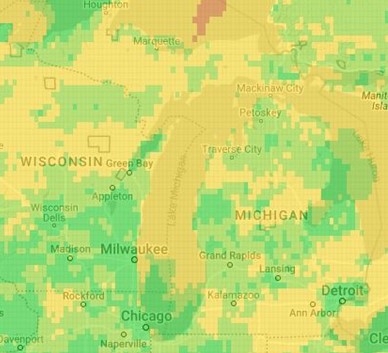Michigan potato late blight update – August 2, 2023
No late blight has been reported in Michigan. Elsewhere, late blight was reported in Yates County, New York and the Provinces of Ontario and Quebec Canada.

In Michigan, no late blight has been reported and current weather conditions indicate low to medium risk throughout the state (Figure 1). On July 17 and July 25, reports of potato late blight were confirmed in Alliston and Mauricie, Canada in the Provinces of Ontario and Quebec, respectively – see following communications from Eugenia Banks Potato Specialist, OMAFRA, shared by Amanda Gevens, Vegetable Pathologist, UW-Madison. On July 28, late blight was reported again in Ontario, Canada in Dufferin County on potato and in Elgin County on tomato. This week, tomato late blight was also reported in Yates County in New York on August 1. A map of reported U.S. late blight observations can be monitored at https://usablight.org/map/.
Recent communications of the Canadian late blight samples shared by Banks and Gevens on July 27, 2023: “…A sample of infected [potato] leaves [from Simcoe, County] was sent to Jean Ristaino's lab at North Carolina State University where it was determined that the pathogen, Phytophthora infestans, was of the US-23 genotype. Banks, Potato Specialist at OMAF, further added that late blight was also confirmed on potato and tomato on July 25, 2023 in commercial plantings in Mauricie in the Province of Quebec. All infected plants were destroyed.
The US-23 clonal lineage/genotype/strain type is generally still sensitive to phenylamide fungicides including mefenoxam and metalaxyl. Banks told [Gevens] that in addition to metalaxyl (ie: MetaStar) and mefenoxam (ie: Ridomil), mandipropamid (Revus), cymoxanil (Curzate), and oxathiapiprolin (Orondis) were all performing well.”
Considering these recent reports and late blight activity, close monitoring and continued preventative fungicide programs are recommended for Michigan growing regions.

Risk calculated using NOAA weather data and colors indicate risk levels as follows: green = very low, light green = low, yellow = medium, orange = high, red = very high.
Please contact MSU Potato and Sugar Beet Pathology at willbur1@msu.edu or 517-355-3863 or MSU Plant & Pest Diagnostics at pestid@msu.edu or 517-355-4536 to receive diagnostic support or visit our websites for more information.



 Print
Print Email
Email

